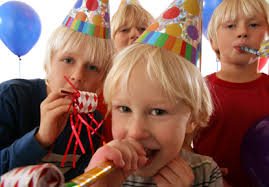Your child comes home from school with a little envelope. He can't wait to show you what's inside. But you already know - his bouncy disposition speaks volumes.
Birthday Party.
 |
| Ah, the joys of birthday parties! |
For parents of a child with ADHD, those two words send a shiver of dread down our spines. While other parents look forward to dropping their little darling off in their Sunday best, a brightly wrapped package in their arms, we feel no such joy.
No, our experience will be different. We'll be careful that our child doesn't eat or drink sugar before he goes. We'll struggle to get him into his birthday best, and then struggle even more to keep him from spoiling it with stains before we leave. And no matter how late we dress him, this always happens. We make sure that the present he gives isn't something he loves himself - the last time we did this, he threw a fit until the birthday boy's mother made her son share the coveted toy. And the present must be something that isn't in the least bit fragile, because by the time he makes it to the front door, it will have been tossed in the air several times, and caught only a few.
As parents drop off their squeaky clean youngsters, you'll linger, trying to decide whether to tell Mommy that your boy can be, "quite a handful." You'll stay at the party with him to put out any fires he starts - figuratively speaking - but literal fires are always a possibility too. Mommy will probably insist that, "He'll be fine." She clearly doesn't know your child.
Now, let me tell you about a personal "Aha!" moment that happened at one such birthday party;
Caleb was about seven. I watched with an eagle eye, through the games, the cake, candy and punch, through the present-opening and playing outside on the swing set. I intervened when he seemed to be getting too wound up, when he grabbed another boy by the jacket and swung him around like ball on a tether. I reminded him how to ask nicely for a second cup of punch. When Mommy attempted polite conversation, I was distracted, afraid I'd miss something my son would surely do. I looked at my watch. It was almost time for the party to be over. We'd almost made it. Then the unruly bunch decided to play one more round of pin-the-tail-on-the-donkey.
Each child got a chance to be blindfolded and spun around by another child, before being aimed at the plastic donkey, plastic donkey tail in their hand. When it was Caleb's turn to spin his friend, the group counted the spins as usual...1...2...3... That should have been the end. But Caleb kept going, 4...5...6...7... Before I could intervene, the little boy was so dizzy he couldn't stand. "Caleb," I scolded. "That's not how you play the game." I helped the little boy up and pointed him toward the donkey, then stayed close to Caleb for a moment before backing off.
Mommy came to stand by me. "He really is fine, you know."
I nodded politely. Obviously she was delusional.
Then something happened.
I watched as time after time, the little boys copied Caleb's version of the game, spinning each child until they were dizzy and crawling on the floor...laughing hysterically. I couldn't help but smile. I looked at Mommy and we started to laugh. The boys were having more fun rolling around on the floor than playing the game. Pure joy-filled fun!
Mommy elbowed me gently. "Boys..." she laughed. "What're you gonna do?"
Maybe she wasn't so delusional after all.
For the remainder of the party, I stepped outside of my parent-of-a-kid-with-ADHD role. I took in the whole scene. Caleb wasn't all that different from the other little boys. They were all wound up and a little too rowdy. But in this moment, in this setting, he was absolutely normal. He was a seven year old boy and he was acting like every other boy at that party.
I learned something that day that I would revisit many, many times over the next several years. Since his diagnosis, I'd forgotten how to see my son as a little boy. Life with Caleb had been so difficult and so very different than his siblings, that the focus had become the diagnosis, and not the child. He still had Attention Deficit Hyperactivity Disorder, and there were behaviors associated with that. But from that day on, I changed my thought process. My son was a child first, and a child with ADHD second.
He is a teenager now and I still use the same mantra; Child First - ADHD Second. God knows it's just as relevant as a teenager as it was when he was seven.
So, what do you think? Have you had similar experiences? How do you decide when to intervene and when to back off?
